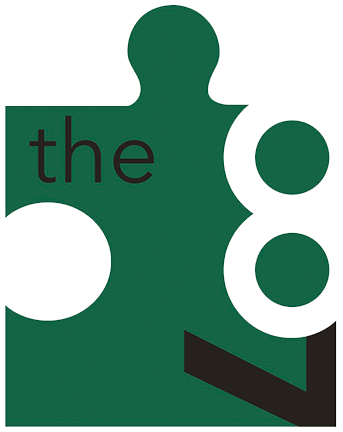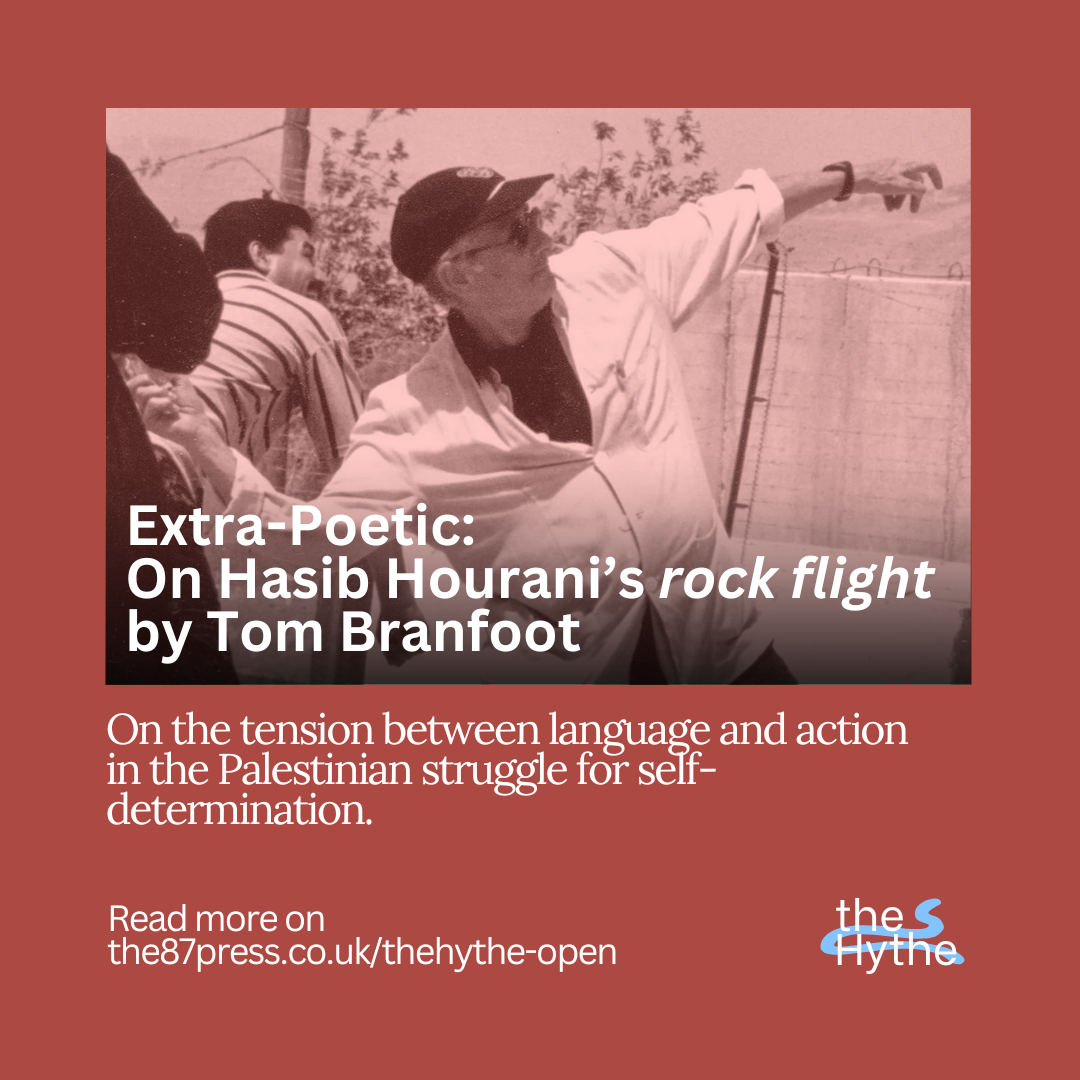[Digital Poetics 4.24] Extra-Poetic: On Hasib Hourani’s “rock flight” by Tom Branfoot
Hasib Hourani, rock flight (London: Prototype, 2024)
rock flight is an evocative title for this topopoetic autobiography of statelessness by Lebanese-Palestinian writer Hasib Hourani. Since the First Intifada, stone-throwing has become a symbolic act of non-violent resistance where stones and rocks in mineral rawness confront combat vehicles, heavily armed troops and Israel’s advanced military technology. Similarly, rock flight recalls the rubble and debris splintering from buildings during airstrikes and demolitions. Hourani’s title also carries an avian undertone, suggesting the rock dove, or pigeon, in addition to the scientific lexicon of ‘resident’ and ‘migratory’, and displacement through habitat loss. As Western superpowers continue to provide arms to Israel (Singh, K. and Stone, M., 2024) while claiming to be they are ‘working around the clock every day to get that ceasefire deal done’ (Al Jazeera, 2024), rock flight is a direct and hopeful response to Israeli aggression in an environment of violent neutrality.
Claiming their relationship to the land in an epilogue, the poet describes how ‘–ı-: the arabic suffixation… turns a word into an ethnonym’ with their surname locating them to ‘houran: syria’s south to jordan’s north directly east of palestine’ (9). Decapitalising nouns removes the specificity of place, draws attention to shifting boundaries and the relationship between the subject and their family – ‘born stateless… refugees by inheritance’ (17) – to countries and geographies. Topopoetics, an intervention in ecopoetry and place writing by British poet Timothy Cresswell (2015:7), understands poetry which uses the ‘place of the poem’ to ‘explore places beyond the poem’, confronting ‘the possibility of dwelling in place’.
While considering dwelling and place, Hourani is concerned with what it means to be ‘elsewhere’, in the opening pages he lists a litany of reasons for dislocation:
“it” means the reason i am elsewhere
“thing” means the reason i am elsewhere
“israel” means the reason i am elsewhere
“something” means the reason i am elsewhere
“entity” means the reason i am elsewhere
“ -------------------------------X--------------------------------- ” means the reason i am elsewhere
“the suffocating state” means the reason i am elsewhere (13)
Metaphorically, suffocation suggests a feeling of constriction by a set of circumstances, in this case, the violent occupation of Palestine by the state of Israel. The word echoes the quasi-homophonic ‘suffixation’ yoking the subject to geography. Using legal hierarchical headings, the speaker reworks human rights violations into an insurgent desire to asphyxiate and incapacitate the state:
1. cutting off its air supply is not murder because
a. you’re almost dead
b. the thing shouldn’t exist (14)
A necropolitical impulse runs through this page with an air of both resistance and resignation:
2. nothing ever really stops existing
a. even if you kill it
i. this is a good thing because we do not want to die
ii. this is a bad thing because burning a flag is not enough
b. so why bother killing it? (14)
The book is an attempt to translate energy, to activate passive objects, ‘a rock is not a rock until it’s thrown’ (18). Typographical innovation is used throughout as if the insurrectionary energy of the text wishes to translate from the spatial confines of the page into actuality beyond the poem, as a thrown rock would shatter a glass cage.
Hourani wants the book, a paper object, to incite action by poetic and extra-poetic means:
HOW TO MAKE A ROCK:
please find a piece of paper
ONE
scrunch it up
TWO
throw it (19)
Later, the reader is instructed how to make a box through step-by-step images and equivocal captions. A box is ‘something you have no power over once you are in it’ (81), ‘something that stops you from moving’ (38) and ‘a cage for things that aren’t living’ (38), analogous to the Israeli apartheid of Palestinian people.
Hourani theorises suffocation and its biopolitical valences in this ethnonationalist context, repeating instructions verbatim for ‘How To Hold Your Breath’ and ‘How To Make Another Box’. Being boxed-in and suffocated are phrases with concrete and metaphorical dimensions, both of which are applicable to the treatment of Palestinians in Gaza, the West Bank, and Arabs with Israeli citizenship who remained in the largely depopulated towns and villages during the Nakba of 1948 which are now considered Israel. Biometric surveillance systems, 24/7 drone reconnaissance and separation walls prevent free movement, spatially oppressing Palestinians – particularly in Gaza (Goodfriend, 2023) – while the IDF's use of tear gas and torture methods, including extreme heat and being hooded physically suffocate their victims. Experiencing genocide at a remove through social media, knowing about apartheid surveillance tactics, indiscriminate bombing campaigns and human rights abuses by IDF soldiers feeds into a feeling of social suffocation regardless of one’s geographical location. Hourani identifies and mobilises this uncomfortable, helpless and incapacitating affect within the long poem form.
Citing BDS sources, splicing manifesto with autobiography through an experimental, anticolonial poetics akin to Mira Matter or Don Mee Choi, Hourani calls to ‘suffocate the suffocating state’ (83). But what can one do when ‘the state that chokes us / is being breathed alive / by bigger empires’ (51)? In the Global North, they write in the afterword, we can only resist by ‘chok[ing] back: boycott, stop traffic, turn a ship around, flood the station. cut off the air supply to imperialism’ (90). Near the end of this book-length poem they write ‘the more time i spend with words. / the more i realise that they just won’t do’. Here is the extra-poetic impulse: words won’t do, rocks must be thrown.
In Arabic numbered subheadings, he draws attention to the international implications of apartheid through tech giant HP’s role in innovating and equipping the state of Israel with security infrastructure such as identification systems, checkpoints, military systems and digital storage solutions in illegal settlements, the profits of which feed back into the global matrix of techno-capitalism (Hourani, 2024:25). These complex networks of Western hegemony are inescapable. The speaker goes back to work after a writing residency to find a new computer setup from HP requiring a fingerprint passcode – ‘i can break through / the plastic barrier of the thing i’m in but then i will just be / trapped again’ (26).
As below, so above – ‘the air is contested’ (43). The ‘suffocating state’ (13) impedes the migratory route of half a billion birds that fly over Palestine every autumn and spring with its aircraft, drones and aerial weaponry, an apparent symmetry with the boxing-in of civilian life on the ground. After detailing the punitively long-winded route from Beirut to the Galilee, the speaker asks us to recall those oil-coated pelicans which went viral briefly, ‘because travelling when you’re coated in thick diesel slip / cannot last forever. we get tired. we all have to land eventually’ (31). Shifting from the second-person plural to the first-person plural, the speaker establishes a sustained identification with non-human species beings:
i am in front of a mirror. and by that i mean i am the cattle
egret in the yellow dumpster and i am also a passenger in a
black minivan looking at the cattle egret in the yellow dumpster
[…] i ink the cattle egret on my right leg forever
and say when i move you move (38)
There are diasporic resonances to this ecopoetic melding of boundaries between self and other when a settler colonial state seizes land and rejects the right of 7.2 million Palestinians to return (32), destroys human and animal habitats and obstructs the movement of Arabs and birds around the territory (Platt, 2008). While the speaker navigates their statelessness, '[living] in a different colony to the one suffocating us' (27), the wading bird is forty kilometres from water in Jenin, displaced from its habitat.'
Empire is an ‘Anthropocene detonator’ as Anna L. Tsing, Jennifer Deger, Alder Keleman Saxena, and Feifei Zhou (2021) identify in the digital interdisciplinary project Feral Atlas, which invites users to explore ‘worlds created when nonhuman entities become tangled up with human infrastructure projects’. Colonial empires fundamentally reshaped landscapes and approaches to land ownership, farming, resource extraction and other land-based projects, contributing to barbaric inequality, environmental and patchy climatic effects for capital gain and continued Western imperial hegemony.
… the first city i see
when i see palestine is jericho. we are driving down a flat wide
road in a straight line, boulders and hollows on either side
and i’m thinking yes i made it and then yes i get it now because
it is about the earth. it has always been about the earth. (50)
Building toward a tenor of environmental justice – noting Gaza’s toxic water, disrupted migratory patterns, and the oppression of native farmhands for Israel’s global trade in date production – Hourani recognises the imperialist tangle and ecological damage resulting from Israel’s occupation of Palestine. It has always been about the earth, which the coloniser sees as asset and the indigenous respectfully steward.
The speaker, who is instrumentally attributed to the poet, addresses the reader in multiple instances about the occasion and formation of the material book we are reading:
where’s that box you made? put this book
inside and close the lid. when you need to come up for air,
open the box and keep reading. (34)
…
i went to collect a draft of this book that you are reading but the
post man said it didn’t exist. (81)
Aware of its own revision, rewritings, edits and versions, rock flight complicates notions of Western historical progress through asynchronous and non-linearity, calling to mind responses to the ongoing genocide that act as if history began on October 7th 2023. Work by anticolonial, Palestinian poets such as Hourani, Mattar, Fady Joudah, Omar Sakr and Mosab Abu Toha, to name a few, confront serious issues with catastrophic implications, challenging more liberal attitudes in contemporary poetry by showing how concerns relating to Palestine interact with all facets of social justice. Publishers such as Prototype, Out-Spoken and The 87 Press are taking market risks in publishing such direct radical poetry taking aim at an extractive, genocidal system of Western hegemony which must end for life on earth to continue. Auto-theoretical in its citation and political commentary on Israel’s technological surveillance state, Hasib Hourani’s rock flight is an extra-poetic call to action possessing a feral desire for language to become object.
rock flight is now available from Prototype Press
*
Bibliography
Al Jazeera (2024) ‘Harris tells pro-Palestine protesters ‘now is time for ceasefire’ in Gaza.’ Al Jazeera, August 10th. [https://www.aljazeera.com/news/2024/8/10/harris-tells-pro-palestine-protesters-now-is-time-for-ceasefire-in-gaza]
Cresswell, T. J. (2015) ‘Topo-poetics: Poetry and Place.’ [Doctoral dissertation, Royal Holloway University] Royal Holloway Research Portal [https://pure.royalholloway.ac.uk/ws/portalfiles/portal/25313757/Complete_poems.2015.final_signed.pdf]
Goodfriend, S. (2023) ‘Blunt Force.’ The Baffler, October 19th [https://thebaffler.com/latest/blunt-force-goodfriend]
Hourani, H. (2024) rock flight. London: Prototype.
Singh, K. and Stone, M. (2024) ‘US approves sale to Israel of $20 billion weapons package.’ Retuers, August 13th. [https://www.reuters.com/world/middle-east/blinken-approves-sale-israel-military-equipment-worth-over-20-bln-2024-08-13/]
Platt, E. (2008) ‘The Migration.’ Granta, July 7th [https://granta.com/the-migration/]
Tsing, A. L., Deger, J., Saxena, A. K. and Zhou, F. (2021) ‘Empire: Anthropocene Detonator.’ Feral Atlas. California: Stanford University Press [https://feralatlas.supdigital.org/index?text=ad-empire&ttype=essay&cd=true]
*
Tom Branfoot is a poet and critic from Bradford, and the writer-in-residence at Manchester Cathedral. He won a Northern Debut Award for Poetry in 2024 and the New Poets Prize 2022. He organises the poetry reading series More Song in Bradford. Tom is the author of This Is Not an Epiphany (Smith|Doorstop) and boar (Broken Sleep Books), both published in 2023.

